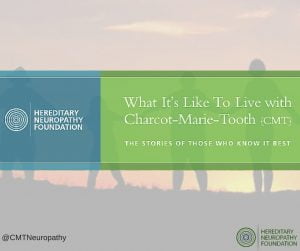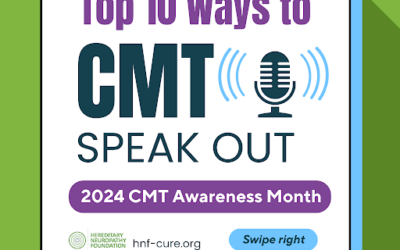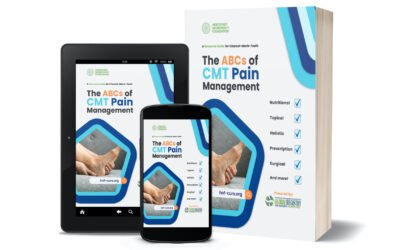 “What is it like to live with Charcot-Marie-Tooth?”
“What is it like to live with Charcot-Marie-Tooth?”
That is a good question that usually doesn’t come with a clear answer.
CMT affects nearly 1 in every 2500 people in the United States and 2.6 million people worldwide, yet it remains a relatively unknown and misunderstood disease. Furthermore, those living with CMT often struggle to accurately explain what it’s like to live with the progressive, hereditary disorder.
Allison Moore, CEO of the Hereditary Neuropathy Foundation (HNF), wanted to solve this problem for CMT patients, their families, and the medical community.
But how?
The answer was to commission HNF’s first Quality of Life research study about what it’s like to live with CMT. While quantitative research is critical to obtaining knowledge related to more effective treatment outcomes, it doesn’t speak to the experience of what it’s like to actually live with CMT.
The study is a collection of over 80 intimate and candid interviews, painting a vivid picture of those living with CMT. These interviews brought to light a range of different experiences: from devastating and heart-wrenching, to courageous and inspiring.
The goal of our Essential Guide is to help CMT patients learn more about how the disease affects others and help educate health professionals about some lesser-known symptoms, emotions, and experiences of people with CMT.
In this guide, you will learn about:
- The physical, emotional, and social effects of living with CMT.
- How delayed diagnosis, incorrect diagnosis, and lack of knowledge by physicians affect CMT patients.
- Attitudes and coping methods.
- Intervention and treatments.
- Making positive changes.
CMT still lurks in the shadows for much of the general public. One of our most important missions at HNF is to show people what it’s like to live with Charcot-Marie-Tooth (CMT). We hope this guide serves as your foundation of hope, education, and inspiration.
Download your FREE copy of our guide HERE.













Thank you for the information
I have just been diagnosed recently with CMT at age 65. I am now having more bladder issues then ever before now knowing why three surgeries never took. I’m having releasing my urine. It’s starting to release so slow then maybe one day later it’s normal. I just get so frustrated not knowing why it’s so back in forth at times.
I also am dealing with this beginning at age 62. Bladder incontinence almost daily as well as occasional bowel incontinence (depending on type of foods). I agree that it is so very frustrating!! This disease just wreaks havoc on our entire body!! I hope your progression is slow.
I also have cmt since my mid 50s .I am 69 and have for the last year been having the same problem. It is frustrating but I just wear a pad for leaks which is not often . I haven’t spoke to my doctor yet .but it’s just good to know I’m not the only one.thanks for letting people know.
Hello I just found out my son of 5 has cmt what can I as a parent do for him my heart is breaking tonight. I just want him to have a normal life without this challenges he also as speech apraxia so this is not so nice. I wish I can help him. If anyone can please give me advice or anything please talk to me.
Hi Antoinette, our son who is five (I see your son is probably 7 now) also has CMT. Yes, it is heartbreaking, but yes we can give them good lives! I wonder how you and he are doing now that two years have passed. I hope things are good.
I would really like to be able to talk with the parents of small children diagnosed with CMT. My concern (tons of concerns) is that I understand the emotional issues she might be having. Additionally some suggestions for talking positively with my 4 year old granddaughter and perhaps her friends. We are seeing behaviors concerning eating, bladder control as well as other issues that we are being told are symptomatic and question that. Of course we question all. If anyone in Southern California has good pediatric CMT care providers (in Los Angeles /Long Beach and or Pasadena areas I NEED SOME REFERRALS from the community.
This is the most important thing in my life and I will not stop until awareness is poked, hard and I can be a part of helping ALL those, particularly children living and living well with this disease.
In these early stages of diagnosis etc. I again would really appreciate any feedback but the referral to good Pediatric care is essential
Thanks guys,
JudyGrammy
Hi Judy,
Thank you for your comment. I think it would be beneficial for you to post in the Inspire Community to help answer your questions. https://www.inspire.com/groups/charcot-marie-tooth-cmt/ We are working on a Health Care Provider Directory that will be a great resource for you and others in our community to find doctors in your area. Keep checking back at http://www.hnf-cure.org for updates.
Best,
Courtney
My wife, her younger sister (who lives with us) and their older brother, all have CMT. They come from a large, extended family. An older sister shows no signs of CMT. At family gatherings, it is amazing to see so many people with physical signs of CMT. Most (if not all) are 2nd and 3rd generation of Icelandic heritage. Most have grown up and still reside in Western Washington state. My wife has 4 children in their 30’s and 40’s and so far none show signs of CMT.
Jeff,
Please make sure they all join the Global Registry for Inherited Neuropathies at https://neuropathyreg.patientcrossroads.org/. Does your wife’s family know what type?